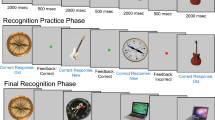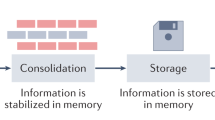Abstract
DESPITE nearly a century of active research into memory, the academic psychologist is singularly ill equipped to offer good advice when asked how to enhance memory. He can only point to the apparent efficacy of techniques developed by informal study since the ancient Greeks first expounded the “art of memory”1. These techniques were rejected as irrelevant gimmickry by the early students of memory, who restricted their attentions to the mindless mechanical recitation of nonsense syllables. Only recently have they been thought worthy of the attention of respectable psychologists2. In this revival spirit we describe here our preliminary studies of a “labelling” procedure which seems to enhance memory.
This is a preview of subscription content, access via your institution
Access options
Subscribe to this journal
Receive 51 print issues and online access
$199.00 per year
only $3.90 per issue
Buy this article
- Purchase on Springer Link
- Instant access to full article PDF
Prices may be subject to local taxes which are calculated during checkout
Similar content being viewed by others
References
Yates, F. A., The Art of Memory (Penguin Books, Harmondsworth, 1969).
Miller, G. A., Gallanter, E., and Pribram, K. H., Plans and the Structure of Behaviour (Holt, Rinehart and Winston, New York, 1960).
Author information
Authors and Affiliations
Rights and permissions
About this article
Cite this article
DALE, H., MCGLAUGHLIN, A. Enhancing Memory with Redundant Labels. Nature 227, 411–412 (1970). https://doi.org/10.1038/227411a0
Received:
Issue Date:
DOI: https://doi.org/10.1038/227411a0
Comments
By submitting a comment you agree to abide by our Terms and Community Guidelines. If you find something abusive or that does not comply with our terms or guidelines please flag it as inappropriate.



